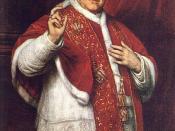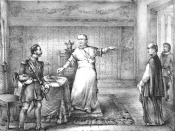Overpopulation has been a debatable issue since humans have begun to roam the earth. In the essay De Anima, Roman philosopher Tertullian speaks on the blessing of catastrophes that help curb overpopulation (Glaze III 2000). As a result of these "catastrophes", like infant death, birth control received little recognition. In ancient times death rates were high, especially during infancy and childhood. Large numbers of children were needed in order to ensure the survival of the human race. The 18th and 19th century brought technological and scientific advances that increased food supplies, helped control disease and made work easier. These advances took effect on death rates as they began to drop and more children lived to have children of their own (Birth 1991).
Robert Thomas Malthus, an economist from Great Britain, was concerned with the earth's carrying capacity. He feared that the human potential to produce offspring far outweighed the earth's ability to accommodate them.
According to his famous essay on the Principle of Population, an analysis of population growth statistics, he recommended the postponement of marriage and strict premarital abstinence as "moral restraints" against population growth (Malthus 1798). Many thought the views were unrealistic as solutions to the problem at hand. The search for more practical methods of contraception sparked the birth control movement.
A variety of birth control methods have been used throughout history and across many cultures. Many methods of contraception, thought to be relatively new, are actually hundreds or thousands of years old. They are simply the advancing or further development of ideas that people who lived long ago came up with. Among them are abortion, spermicides, intrauterine devices, and condoms.
Abortion has been used as a method of contraception since ancient times. It has also been a topic of debate. The ancient Hebrews had laws against...


